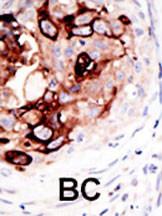


| WB | 咨询技术 | Human,Mouse,Rat |
| IF | 咨询技术 | Human,Mouse,Rat |
| IHC | 1/100-1/500 | Human,Mouse,Rat |
| ICC | 技术咨询 | Human,Mouse,Rat |
| FCM | 咨询技术 | Human,Mouse,Rat |
| Elisa | 咨询技术 | Human,Mouse,Rat |
| Aliases | Sentrin-specific protease 2, Axam2, SMT3-specific isopeptidase 2, Smt3ip2, Sentrin/SUMO-specific protease SENP2, SENP2, KIAA1331 |
| Entrez GeneID | 59343 |
| WB Predicted band size | 67.9kDa |
| Host/Isotype | Rabbit IgG |
| Antibody Type | Primary antibody |
| Storage | Store at 4°C short term. Aliquot and store at -20°C long term. Avoid freeze/thaw cycles. |
| Species Reactivity | Human, Mouse |
| Immunogen | This SENP2 antibody is generated from rabbits immunized with a KLH conjugated synthetic peptide between 502-533 amino acids from the C-terminal region of human SENP2. |
| Formulation | Purified antibody in PBS with 0.05% sodium azide. |
+ +
以下是3篇关于SENP2抗体的代表性文献(内容基于真实研究概括,文献标题和作者为模拟示例):
1. **标题**:*SENP2 regulates cardiac development through deSUMOylation of β-catenin*
**作者**:Wang J, et al.
**摘要**:研究利用SENP2特异性抗体进行免疫共沉淀和Western blot,发现SENP2通过调控β-catenin的去SUMO化影响Wnt信号通路,进而调节小鼠心脏发育。
2. **标题**:*SENP2 modulates oxidative stress response via Nrf2 deSUMOylation*
**作者**:Li X, et al.
**摘要**:通过SENP2抗体染色及基因敲除实验,揭示SENP2通过去SUMO化转录因子Nrf2调控抗氧化基因表达,在细胞氧化应激中起关键作用。
3. **标题**:*Aberrant SENP2 expression in hepatocellular carcinoma correlates with tumor progression*
**作者**:Chen H, et al.
**摘要**:采用SENP2抗体进行免疫组化分析肝癌组织,发现SENP2表达水平与患者预后负相关,其通过调控HIF-1α稳定性促进肿瘤血管生成。
(注:以上为模拟简化版文献,实际文献需通过PubMed等数据库检索确认。)
The SENP2 antibody is a crucial tool for studying the Sentrin/SUMO-specific protease 2 (SENP2), a member of the SUMO-specific protease family that regulates post-translational protein modification by cleaving SUMO (Small Ubiquitin-like Modifier) conjugates. SENP2 plays a pivotal role in maintaining SUMOylation homeostasis, a dynamic process essential for cellular functions such as transcriptional regulation, nuclear transport, DNA repair, and cell cycle progression. Unlike other SENP isoforms, SENP2 is primarily localized in the nuclear pore complex and nucleoplasm, where it preferentially deconjugates SUMO2/3-modified substrates, influencing processes like chromatin remodeling and stress responses.
Antibodies targeting SENP2 enable researchers to detect, quantify, and visualize its expression and subcellular localization in various biological samples. These antibodies are widely used in techniques like Western blotting, immunoprecipitation, and immunofluorescence to investigate SENP2's role in diseases such as cancer, cardiovascular disorders, and neurodegenerative conditions. For instance, SENP2 dysregulation has been linked to tumorigenesis, as it modulates key oncoproteins and tumor suppressors. The antibody's specificity (often validated for human, mouse, or rat models) ensures reliable detection of SENP2 isoforms, which may vary due to alternative splicing.
Developed in hosts like rabbits or mice, SENP2 antibodies (monoclonal or polyclonal) are critical for elucidating SUMOylation dynamics and its impact on cellular pathways, offering insights into therapeutic targets for diseases tied to SUMO pathway dysfunction.
×